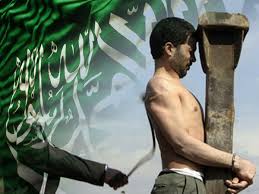
On January 16, 2015 Senator Patrick Leahy of Vermont requested permission to address the United States Senate regarding a matter that hasn’t got much attention lately, namely the continuing abuses of human rights by Saudi Arabia. To help underscore the serious nature of that country’s abuse of people and the fundamental right of free expression.
An ideal which has been paid in blood many times throughout history an continues today in certain countries the United States considers strategic allies and friends.
Leahy talks about the case of two individuals in particular 1) Abu al-Khair and 2) Raif Badawi – a man sentenced to a 1000 lashes in Saudi Arabia for insulting Islam.
Oddly enough the sentence was considered an act of leniency on the part of the judge involved. With that said lashing is considered a violation of the UN treaty against torture:
“Mr. President, on January 12 in Saudi Arabia a prominent human rights lawyer, Mr. Waleed Abu al-Khair, was handed a 5-year extension to his 10-year prison sentence. Mr. Abu al-Khair, who is the founder and director of the watchdog group Monitor of Human Rights in Saudi Arabia, was also fined, banned from travel outside the county for 15 years after his release, and his websites will be shut down. What were the crimes that brought about this sentence? He was charged with harming the kingdom’s reputation and insulting judicial authority, among other violations related to his non-violent activism.
This case and others like it certainly have harmed the kingdom’s reputation, and insulted its judicial system, but the fault is not Mr. Abu al-Khair’s.
After years of defending human rights activists as a legal advocate in Saudi courts, he was called in front of a terrorism tribunal at the end of 2013 for a trial that from its earliest days was declared a farce by human rights organizations. This was not the first time Mr. Abu al-Khair was made a target of the justice system, having first faced trial in 2011 for signing a petition that called for government reform.
During the fifth hearing in front of the terrorism tribunal he was jailed mid-trial under the January 2014 anti ter ror ism law, which covers verbal acts that harm the reputation of the state. Mr. Abu al-Khair was eventually sentenced to 10 years for his activism amid growing international condemnation of Saudi repression. His decision not to disavow his beliefs led to this week’s further sentencing.
Unfortunately, Mr. Abu al-Khair’s case is not unique. As more Saudis have begun to speak out against government repression, the monarchy has responded by escalating its crackdown on dissent, including by using the already dubious terrorism tribunal system to punish human rights defenders.
It is ironic that while Saudi officials condemned the brutal killings of journalists at Charlie Hebdo, and their Ambassador attended the rally in Paris, their Justice Ministry was preparing to carry out the first of 1,000 public lashings of Raif Badawi. Like the cartoonists, Mr. Badawi has been accused of insulting Islam, and like them and his former lawyer, Mr. Abu al-Khair, he was simply exercising his nonviolent right of freedom of expression. Needless to say, his persecution has drawn an international outcry, including by many of those who joined the Saudi government in denouncing the attacks in Paris.
The United States and Saudi Arabia have long been strategic allies, and we want that relationship to continue. But the fundamental right of free expression cannot be a casualty of convenience. The injustices I have described must be addressed. Not only do these actions violate the Saudi government’s stated policy and its commitment as a member of the UN Human Rights Council to protect human rights, but they are a flawed strategy for discouraging dissent. Ominously, as we have seen in many countries, they may cause critics of the government to resort to violence to achieve their goals.
I urge the Saudi government to release Mr. Abu al-Khair and Mr. Badawi and dismiss the spurious charges against them. This kind of repression and barbarity have no place in the 21st century.”
Source: Congressional Record
See video: CFI Statement on Raif Badawi and Waleed Abu Al-Khair at the 27th UN Human Rights Council – 9/17/14 https://www.youtube.com/watch?v=vg2xljHDBeY
See related videos: Saudi Arabia – Oppression of Expression – Support Raif Badawi, Turki Al-Hamad and Hamza Kashgari https://www.youtube.com/watch?v=GcvLJ3esGgc
Note: Senator Leahy is the Ranking Member of the Senate Judiciary Committee. He is the senior-most member of the Appropriations Committee and of the Agriculture Committee. Leahy is the Ranking Member of the Appropriations Subcommittee on State Department, Foreign Operations and Related Programs. He ranks first in seniority in the Senate and is the President pro tempore emeritus. Needless to say he is very active on human rights issues around the world!

